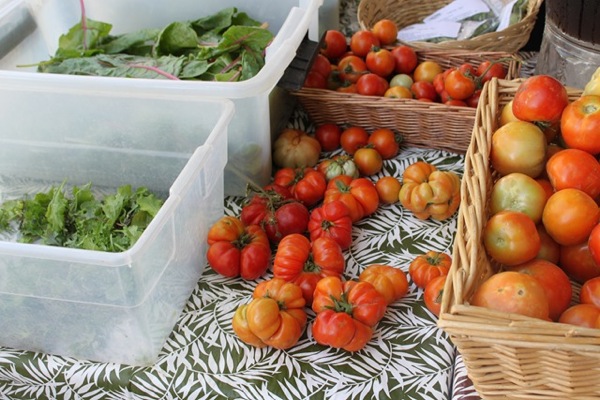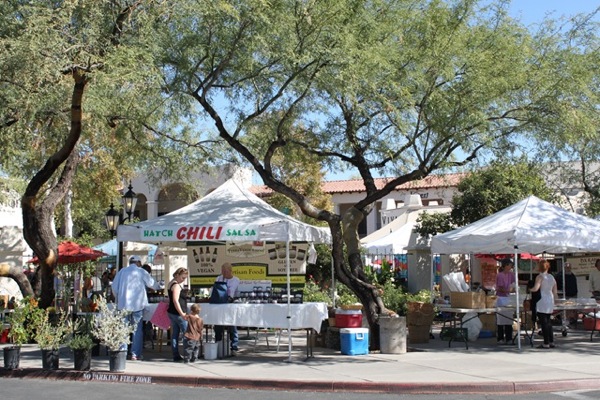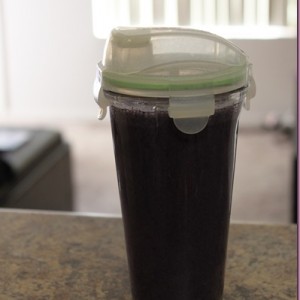Is organic that much better?
The new blog is going up today! As the change happens, things may be a little funky for the next couple of days. Thank you for hanging in there with me and hope you love the new look <3
____________________________________________________________________________
It was an amazing long weekend.
A trip to the Children’s Museum,
BBQing with friends,
and just enjoying time with the fam.
Over the weekend, I don’t tend to watch much of the news channels since I work on Saturday and we’re laying low on Sunday.
Every Monday morning (Tuesday = Monday this week), I like to catch up on what’s going on.
The latest: a new Stanford study indicating that buying organic has no health advantage over purchasing conventional foods.
Come again?
I listened to the news recap of the study and then read a little more about it online. This ruffled my feathers a little, since I’m a huge advocate for organic foods, and it seems like the media is often trying to dissuade consumers from purchasing organic over conventional.
Some interesting facts from the study:
-The study was not financed by an outside source or company, which is important to me because I feel like studies are often biased.
-The conventional fruits and vegetables that were previously sprayed with pesticides and chemicals were still found to be within “safe limits.” What exactly are safe limits? The FDA allows a lot of processed foods to have “safe amounts” of disgusting defects (only click the link if breakfast happened a long time ago and you want to be sufficiently grossed out)
-While many of the fruits and vegetables didn’t indicate significant differences in nutrients, organic chicken and eggs contained higher levels of omega 3s and phosphorous (which is easy for us to get enough within our diets, but still notable). Organic meat products were also less likely to contain antibiotic-resistant bacteria
-Ripeness has a huge impact on nutrient density, so it was more difficult to compare fruits and veggies of exact ripeness
-While the nutrition of organic vs. conventional proves to be similar, chemicals, pesticides and sustainability are more of a concern for me. I like to vote with my shopping cart, and by purchasing organic, it’s my way of saying that I prefer foods that haven’t been liberally sprayed with chemicals and those that have been produced with sustainable farming practices.
When it comes to buying organic, don’t feel like it has to be all or nothing. I purchase the dirty dozen in certified organic, and Liv only gets organic fruits and veggies when she’s at home, since the effects of pesticides on children haven’t been thoroughly studied.
Organic products can be expensive, and if someone wants to make fresh produce a part of their lifestyle, buying conventional is 1000x better than not buying fruits or veggies at all. It’s also a great option to pick up frozen organic fruits and veggies (which are sometimes less expensive) or hit up local farmer’s markets for better deals (and to support local farmers!).
What do you think about the study? Is buying organic important to you?
Hope you have a great day and I’ll see ya later <3
xoxo
Gina



















You are totally right in that it isn’t all about the nutrient composition or organic vs conventional, which the news skipped right over. It’s about the way the produce is grown. The news is sabotaging organic by not providing enough background information on the benefits of organic and just focusing on the nutrient composition.
I was waiting to see what your thoughts were on the article. I want to read more about the study and then will decide what I want to do about organic produce. Thanks for offering your opinion.
Hi Gina!
Great post – I really appreciate that you posted the objective facts from the study. (I’m a scientist and a physician in training, and you reviewed it much like I do at work and school!) I agree with your thoughts about organic food and also vote with my shopping cart.
I’m not sure if you’ve already read it, but there is an excellent book by Michael Pollan called “The Omnivore’s Dilemma” that really helped inform my opinion on food choices. He doesn’t preach or lecture his audience, but rather shares his own journey to come to a better understanding of how our food is grown/produced/manufactured in different “sectors” – our standard corporate food sources, certified-organic farming, small-scale growers and local producers, and foraging/hunting for oneself. Of course, the book isn’t the end-all-be-all of the food discussion, but I thought it was a really interesting and also informative read.
Thanks as always for the great posts!!
I was going to bring up this book too. It made me realize what the organic label actually means! I think it is likely the quality of organic produce varies a lot from farm to farm.
My two cents on the actual study is this: the authors set out to answer a specific question: Are there more vitamins and minerals in organic produce than in conventionally farmed produce? They answered that question to the best of their ability with the data available. That is what a scientist does, whether they get the answer they expect or not. The journalist who wrote the story for the New York Times definitely could have provided better context for the article, but that doesn’t change the fact that the actual scientists came up with an answer a lot of people aren’t going to like. I think it is still important to have this information and not just disregard it because it doesn’t fit in with your ideas. I’ve seen SO MANY healthy living blogs(not you Gina, but others that I like and admire too) post ads from Whole foods or other completely unsupported sources that say organic X has 1000x more Y than conventional X, and treating these things like the gospel truth when apparently that really isn’t the case.
You may still feel there are valid reasons to buy organic such as those Gina posted above, (I personally buy organic meat and dairy) but I think it is important to have as much information about these things as possible, especially since some organic products are SO much more expensive than the conventionally farmed equivalent.
I will second (or third) recommend reading Omnivore’s Dilemma. It truly is an eye-opening read and I found it really helpful in helping me form my own food philosophy.
While I am certainly a “never say never” sort of person, I make it a point to BUY LOCAL as much as I possibly can. We belong to a CSA where we get fabulous, in season produce. It happens to be from a certified organic farm, but please know that it doesn’t make financial sense for a lot of small farms to certify themselves as organic…but many of them have organic (or better than organic) growing practices. You have to do your research. Talk to farmers. I don’t assume anything, even at a farmer’s market. Many farmer’s markets have re-sellers intermingled with actual growers (unless you are at a grower’s only market). I never hesitate to ask “when was this picked”, “do you grow this yourself”, “are these sprayed?”
Of course committing to this philosophy also means we don’t generally eat asparagus (gasp!) very much outside of spring, when it’s season. But guess what? The asparagus we do get is amazingly more flavorful and enjoyable than the typical grocery store fare…and we gorge on that stuff until we can’t take it any longer.
I could go on and on and on…but I’ll stop and say that any one even remotely interested in this topic MUST read Michael Pollan’s book!
Certain foods I usually buy organic & some of these are particularly important to me, especially meats and poultry. If there isn’t a significant price difference, then I’ll usually buy organic. Unfortunately, food prices in Canada are REALLY high, especially for organic produce!
My mom’s boyfriend was an organic farmer (he’s now retired) and he will tell you that organic produce is no better than non-organic. Organic farmers still use pesticides that are natural — but it doesn’t mean they are any less toxic to humans. He’s all for supporting local, so by all means do that – but definitely check to see where the organic produce is coming from.
Meat is a different story for me – and that’s just something I will pay extra for!
I must agree with this comment. It is amazing how uneducated the ‘organic consumer’ is.
I work in agriculture and there are TONS of pesticides and herbicides labeled for organic foods. People assume that organic means ‘no spray’ when this is just not the case.
Anyone who has ever tried to grow their own produce will know that if you plant an apple tree or a tomato plant and don’t spray it with anything ever that while you will have fruit, it will be blemished. This is fine for the backyard gardener, but how many of you would buy apples covered in spots or tomatoes with blossom end rot? Organic produce is sprayed so that your fruit is as perfect looking as non organic produce. The only difference is that the sprays are ‘organic’ – definition, derived from the earth. This does not make them any safer – i.e. copper. Copper is a common organic spray. It’s an element – organic – but is it safe to ingest in large amounts? And I say large amounts b/c another problem with organic sprays is that they are often not as effective as a human tweaked synthetic spray and have to be applied more often.
Do your research people.
I would like to add that just b/c I think organic is a joke does not mean I support factory farms either. I try to grow as much of my own as feasible and buy locally otherwise. I would much rather have local, minimally sprayed produce from a small family farm than main stream (Factory) organic.
Organic is important to me. I buy about 90% organic veg/fruit/meat and 10% not. And if we’re traveling or at someone’s house where I can’t really say “excuse me, what kind of meat is that? or do you have any other sources of protein?” I have whatever is being served.
Man, I really hope that buying organic is safer and healthier for us bc my wallet definitely notices the price difference!
i’m not sure about the difference nutritionally speaking but in my opinion a organic apple has 10 times the flavour, I will always pay the extra and get organic apples
i totally agree- taste wasn’t a factor they considered in the study
I think it’s important to pay attention to the science (especially a huge meta-analysis like this study) and not blindly follow labels like “Organic” just because they sound better instinctively. Remember, the “organic” foods industry is full of corporations using marketing ploys to play on our emotions – just like other food industries. It sounds like what you want is food that is as pesticide-free and nutritious as possible. You need to let go of the idea that the label “Organic” corresponds to these things. Start looking for food that has the qualities you want, not the label you think correlates to those qualities. You yourself acknowledge that the safety standards for pesticides, antibiotics, etc. are insufficient. So why do you go by the “Organic” standard that has been approved by the same biased bureaucratic bodies? Is it any more meaningful than those bogus safety standards? Looks like it’s not.
Based on this study (which is a misnomer – it’s actually a statistical report on over 200+ other studies), I will still buy organic animal products – meat, fish, dairy, and eggs, because it seems like the label “Organic” actually corresponds to the qualities I look for in these products – higher nutritional value, less antibiotic resistant bacteria, fewer chemical byproducts and traces. With most of the vegetables they studied, it seems like “Organic” doesn’t correspond to these things, so I will continue buying fresh, local vegetables through a “CSA” instead of the overpriced “Organic” produce at the supermarket which has absolutely no reliability to me.
I don’t buy organic for any of the reasons this study covered. I buy it as much as my budget allows because my mom had stage 3 breast cancer in her early 40’s, my grandmother had what’s considered a childhood form of leukemia in her 70’s and I’ve known more people who’ve had cancer than I can count (including two men with breast cancer). I live in a small town of about 4500 in the San Joaquin Valley in California, where we grow everything from cotton and corn to grains, tomatoes, stone fruit, nuts and even parsley now. My family has farmed for generations. The chemicals that have been put into our soil terrify me, and I’ll never be convinced that they don’t have something to do with all of our strange cancers in this community. I’ll continue to support organic producers.
That is definitely scary and unnerving! These are the types of blatant, in your face truths that people/studies seem to so easily overlook. If having a nuclear reactor in an area can be linked to increased rates of birth defects, why is it so much more politically incorrect to highlight how proximity to pesticides is linked with increased incidence of cancer?
Hey Gina! I totally agree with you that buying Organic is important. But recently I’ve become less concerned with buying organic as I am with buying local. Obviously I don’t have to tell you about the corrupt food industry and you know that what the FDA says is organic or “safe” wouldn’t always be what we want to eat. I just think FDA organic gets so formulaic (with how long the soil has been chemical free, etc.) and some companies/farms will always find loopholes to make food easier for them and not as great for us. Am I being paranoid?
Buying local is the best way to ensure that your food was on the plant longer (less transportation time), this means farmers have less incentive to spray with pesticides, right? Not to mention, if you are a farmer’s market fan like me you can actually ask the farmers what they spray with. Also, it’s just better for the economy.
Obviously, you know WAY better than me! And I would LOVE to hear what you thing- I’m a huge fan of yours and love the blog 🙂 Thanks for always sharing your life and tips with us! You’re the best!
Also you should totally do a post on GMO- I’d love to know your thoughts
Our family is big on sustainability. We spend more money on food simply because of the practices behind the food. Being a business major, I respect companies who actively work towards sustainability (usually most organic companies do) a lot of larger companies can say in a fancy way that they do too, but they also have a lot more money to work with. We buy all of our dairy products organic, and stick heavily to the dirty dozen – organic only. To me, my peace of mind is worth what I spend at the grocery store. We are big on local farmer’s markets, and will always buy organic meats as well. Nutrients are important to me, and if I feel better with the organic stamp on things, that is all that really matters to me.
Our son, when he reaches food age, will also only eat organic. Again, for my family, we do organic and locally grown because of the practices behind them. My husband and I don’t have all the money in the world, but we definitely have a high budget for groceries… I mean our bodies are worth it. My son is breastfed so everything I eat he gets… which makes me EVEN more aware than ever.
I 100% agree that buying conventional produce is better than buying no produce – so if that’s what someone can afford, that’s what they should do.
That said, there is more to organic than our personal health; conventional agriculture essentially kills everything in the soil and then pumps it back up with fertilizers, rather than utilizing and enhancing the nutrients that are there naturally. The nutritional difference between organic and conventional produce may be small, but the difference in the soil, water, and air sure isn’t. not to mention the effect of pesticides and chemicals on the communities around farming areas. Tomatoland by Barry Estabrook is an insightful and sometimes harrowing look at human element of agriculture.
We have future generations to consider, and I believe organic farming is going to play a huge role in that.
My news outlet reported that the study did find that organic produce has 35-45% fewer chemicals in it than conventional produce, and the same goes for pork and chicken. This is a big deal for things like carrots and apples which are foods that have outsides that we eat.
I don’t know if some people match “healthy” with “low cal/fat free/weight loss” and that’s causing confusion. I certainly used to be one of those people but thankfully I’m learning that while my weight loss journey is very important to me, even more important is the quality of food that I am putting in my body. 35-45% fewer chemicals sounds good to me so point me towards the organic aisle! 🙂
Buying ANY fruits/vegs is more important than their organic status to me, and I like your statement in boldface type expressing a similar sentiment.
I have always bought what looks good, fresh, is on sale and in the front of the store because to me that means it’s seasonal, and sometimes the peaches for example that are conventional and on sale or on a grocery store club-card buy and in abundance look far better and tastier than the organic ones off to the side that are beat up and in a sad little bin! I think we all just have to do what seems right and makes sense for us, given all the facts and choices at hand.
Good luck with your new blog!
I saw the study too and in the article I read it also mentioned that children should still eat organic – which sounds like they did find differences just that those differences were all within the legal limit.
Our farmer’s market doesn’t have a whole lot of organic…so is local better than organic? Wouldn’t it mean that they still use all the same pesticides? I was really wondering about that during peach season, we have great Colorado peaches, but it was difficult to find local organic both at the farmer’s market and at the grocery store. So since peaches are on the dirty dozen, I only bought them if I could find organic + local. But those weren’t available for as long as the non-organic but local, and the organic non-local didn’t look as good.
I try to buy anything on the dirty dozen list organic, and also meat, milk and eggs if possible.
You should ask your local farmers at the markets about their practices. It is a VERY expensive and lengthy process to get certified as an organic operation. A lot of farmers follow organic, pesticide free practices, but are not certified because the cost is counterproductive.
I know two farmers that have certified organic farms back in my home state. I have always wondered why the price of ‘organic’ is so much more than the conventional counterparts. You know what the farmers said when I asked? The price is high because they know people will pay it. It takes no more man power to produce organically grown produce. They are even cutting costs by not using thousands of gallons of pesticides each growing season. I don’t buy organic unless the price is equal to conventional. To me, organic is more a marketing strategy than anything. I say this because a project I was apart of in college studied conventional and organic produce from local supermarkets. Organic produce was found to have pesticide levels approaching that of conventional. Why? Because once that food hits the supermarket, it gets mixed in with other produce, is touched by people that have been touching pesticide laden things, and so on. Now, I do think buying meat that isn’t pumped full of antibiotics and fed nasty unnatural food is a good practice, but again, the price of these things is inflated simply because people will pay that price. I, for one, wish these corporations would stop using organic as an excuse to jack up prices.
I always wondered about the possibility of organic being higher simply because people will pay it, and that it seems that using pesticides would equal a higher price. I buy local/seasonal and what is at the front of the produce aisle and use the dirty dozen rule as much as it’s feasible without going to a few different stores to get a better price. My eyes were opened about buying only organic meats and eggs after seeing Food Inc. I highly recommend it!!
Coming from agricultural background, I try to purchase local whenever possible. I rarely purchase organic unless there are other aspects of the product I enjoy or am seeking. As other commenters have stated, organic is commonly nothing more than a marketing ploy. Too many consumers don’t take the time to really learn about agriculture. I know many “conventional” farmers and they truly care about the land, especially since their families rely on each and every harvest to survive. Also, I NEVER buy anything because it says “natural.” Organic products typically have a cretic action behind them (which only means they are occasionally audited by a third party company) whereas there is nothing behind “natural” products.
I’m sure some organic products and companies are truly what they advertise, but I’d much rather spend my money locally and support local conventional farmers who I know are raising products they way I would myself.
I buy some things organnic but def not all-it is sooo expensive. But I do buy lots and lots at farmers markets during the warmer months so I think that is important that they are locally grown and taste delish! As long as your making good choices in eating fruits and veggies that matter most of all. I think organic can be good for some things like spinach and eggs but not at all important when it comes to banannas. I feel like some people think because it is organic it is healthier or better for you when that is not necessarily true, what is most important is that you eat lots of yummy colorful nutrients. I eat tons of fruits and veggies each day and while its warm I focus on buying local not organic.
I don’t buy organic – I buy what is at our grocery store which usually tries to provide local produce when it can during the summer months. I also go to the farmers market in my town. We have our own garden at home and plant most of what we use during the summer. In the winter its a different story, so I usually just buy what is at the store – what is on sale.
The one thing that I think is important to think about is that I wasn’t raised on organic fruits and vegetables and I turned out ok. I know a lot of mothers now who are buying organic for their kids, and I know they are trying to do the best thing for their kids, but at the same time most of us grew up on regular produce that was sprayed with pesticides and we all seem to be doing ok for now. And a lot of organic farmers still use pesticides, its just organic pesticides but who really knows what organic pesticides means. In reality we will never know the effects of the food we eat – we may get cancer down the line and what not, but we will never know what causes any diseases we get. Eating healthy is the most important thing no matter where or what kind of produce you buy.
“In reality we will never know the effects of the food we eat – we may get cancer down the line and what not, but we will never know what causes any diseases we get.”
Really? Did you just mean cancer here? Because we sure as heck know what causes diabetes, heart disease, etc.!
J – I agree 100% with you. I was raised eating conventional (sometimes canned) fruits and vegetables and I’m 30 years old and can count the number of times I was sick on one hand and am currently healthy. Unfortunately, no one really knows what causes cancer, but all we can do is lead a health lifestyle that works for us and makes us feel our best, surround ourselves with loved ones, and give back to the community.
I’ve never heard of someone getting diabetes/heart disease eating conventional fruits and vegetables unless they were already prone to it.
I thought the same things, although I read the study as being strictly on the nutrient content not whether it was a healthier option, IMO there are other health factors than nutrition like pesticides etc.
For me buying organic meats has so much more to do with the nutrient content, it’s about humane treatment of the animals as well, something you don’t get through conventional farming.
I guess a study could never cover all those faccets, but it is interesting to learn that you’re getting the same nutrients alone. I also totally agree that if you can’t go organic, any produce is better than non.
Can’t wait for the new blog look!
There were some great comments about this on a post caitlin (htp) did about this a few weeks ago. I didn’t realize how much organic food is sprayed with chemicals that might be just as dangerous. There were a few people in the industry who weighed in in the comments about what pesticides in organic produce is really like. I stillfeel like I have tons to learn, but it definitely encouraged me to pursue farmers market produce and talking with local growers.
We definitely buy organic foods when we can, mostly from our local farmers market in the summer. I also think that fresh, ripe produce tastes so much better than unripe fruits and veggies (organic or not) that have traveled thousands of miles to get here (never mind the carbon footprint!), so we try to buy local most of the time.
I do think this whole study seems a little silly and is only intended to create a media circus. It really does not surprise me that conventional and organic produce have similar nutritional stats and just because potato chips are organic, it doesn’t make them healthy… I could go on and on about this.
The reason why we buy organic is to avoid many of the chemicals, hormones and medication found in conventional foods. I see any other benefits as a bonus.
Great post! I have been curious for quite awhile how much the foods labeled “organic” really differ that much from conventional. I guess it turns out not that much! I tend to purchase the “dirty dozen” organic for my family as well. I’ve been shopping at farmer’s markets a lot this summer, but unfortunately they’ll be closing soon 🙁 I guess I just need to do some more research to find out what the best option really is. I’d love to join a local CSA as I really feel like that would be the best bet.
This is very interesting but I just have to disagree. I have been growing a lot of my own produce this summer and they taste so much better and fresher than even the organic versions in the stores, but conventional doesn’t even compare. I genuinely feel like I can taste chemicals in conventional produce, but maybe that’s all in my head.
And really, what is a “safe” amount of chemicals to allow into your body? If I put it in a spray bottle and spritzed it on my tongue, people would tell me that was unsafe. Why would I spritz it on my food and put THAT on my tongue then?
Even still, money is money and I have to buy conventional sometimes so no judgement towards people who never buy organic!
Lately, we have been growing our veggies and some of our neighbors have
Honestly, I will go with the dirty dozen IF I can afford it. Organic is so, so expensive around here. I hate having to buy it so I try to go to a farmer’s market. Like you said, buying conventional fruits and veggies is better than not buying at all.
My main focus is buying sustainable fish, chicken and meat products. I rather put that money there than the fruits and veggies.
To each is their own.
I thought the article was very interesting and the I believe the research team confirmed what many other studies have-that there is not much of a NUTRITIONAL difference in produce that is organically farmed vs. conventionally farmed. I do think the study does point out many of the other real and perceived benefits of organically raised food. My family farms and we have a mix of both certified organic, organic-not certified and conventional farmers in the extended family. For me, it comes down to price, what is in season and what looks good. Many times organic is cheaper than conventional and that is what I will buy. But, I certainly won’t pay more for it.
I am confused as to what you meant by this “What exactly are safe limits? The FDA allows a lot of processed foods to have “safe amounts” of disgusting defects….”?
I am not sure if you meant safe limits of pesticide residue on food, but the article you linked to has nothing to do with organic vs. conventional foods, it is referring to defect action levels in processed foods, which is a completely separate issue. It may seem disgusting, but defects are a fact of food and farming–veg and fruit are grown outdoors in a diverse ecosystem of microbes, insects and other plants and animals. This is especially true in “sustainable” farming practices because the farmer is limiting the types of pesticides she is using, therefore promoting the biodiversity on the particular farm and/or field. It is the FDA’s position that a farmers should NOT use chemicals in order to reduce defect levels. From this link: http://www.fda.gov/food/guidancecomplianceregulatoryinformation/guidancedocuments/sanitation/ucm056174.htm#intro
“The use of chemical substances to control insects, rodents and other natural contaminants has little, if any impact on natural and unavoidable defects in foods. The primary use of pesticides in the field is to protect food plants from being ravaged by destructive plant pests (leaf feeders, stem borers, etc.).”
Just wanted to point that out so that your readers don’t confuse the two subjects.
This is a really interesting and complex subject.
There are some other things to keep in mind when choosing organic or conventional produce. Synthetic pesticide residue poisons insects, animals, wild habitats and groundwater. Organic farms can’t use GMO seeds. Many organic farms practice crop rotation and soil conservation. So do many conventional farms, which is why it may be more important to buy local (when possible).
I realize that there are still issues with the organic label and greenwashing. I purchase the bulk of my family’s fruits and veggies from our local CSA (who happens to be certified organic), but we buy conventional produce as well.
When studies like this come out, I would encourage everyone to do further research. To me, this article is saying that it makes no difference whether you buy organic or not, but they don’t delve into ALL the organic vs. conventional issues.
as i was multi-tasking last night, i heard this report come on the tv. i looked up at the tv, paid attention to read the points and then rolled my eyes and went back to my multi-tasking. you see, i was one of those that rolled my eyes at organics 5 years ago. i thought it was a way to get more of my money. then about 3 years ago i read Jillian Michael’s Master Your Metabolism and it changed my views and the way i began to feed my family and myself. i began doing more research. and now i’m a huge believer. i feel like you can make a study “prove” whatever you really desire for it to “prove”. but i hate that it can so easily mislead so many people that just trust whatever is told to them. but each person has to do the research themselves to really come to their own perspective.
This study helps me feel better about the fact that my family really cannot spring for organic unless it is on super sale. I’ve read (and do) rinse my produce in a water and vinegar bath. It really does get waxes, etc. off of my food.
I have always wanted to make the switch to organic produce (I’d say about 30% of my stuff is organic at the moment) but my fiance thinks it’s just a way for companies to charge you more money and scare consumers and a fruit is a fruit is a fruit. Josh is getting his phd now so he researches everything and said he hasn’t found any evidence to persuade him to buy organic over regular. I’d like to at least get all of the dirty dozen organic. And once we’re married I’ll be doing our grocery shopping (he loves to cook I love to shop) so I figure I can just put the organic in the cart and no one will be the wiser. ;p
Funny, I live in Ontario, Canada, and I heard this news story on the radio this morning as I was driving to work! I try to buy organic when I can and when my budget allows. I’ve seen the dirty dozen list before and those are the things I really try to pay attention to. I’m fortunate because there is delivery service in my area that provides weekly deliveries of organic produce for a very reasonable cost, so in the winter I tend to use it. In the summer, we do buy local and eat according to what’s in season in our own garden.
I buy organic for dairy, eggs, and the dirty dozen and whatever else I can find/afford. Though the nutritional difference between organic vs. conventional may be dubious, at least the known carcinogens and chemicals are documented to be less in organic produce. I don’t like to eat chemicals with my food. Plus organic tastes way, way better.
I’m from Pakistan and grew up eating fruits and vegetables that were not necessarily organic, but not genetically modified and sprayed into oblivion like in developed countries – onions, scallions, carrots, potatoes, radishes (all roots basically) kept growing things out of their nodes and none of this ‘bud nip’ BS was sprayed on them to prevent NATURAL growth from occurring. And all of the fruit has this amazing, amazing fragrance. The only stuff that I have found to be as real as I have seen in other countries (Pakistan, Jamaica, Peru… countries that are just not as advanced in terms of food technology) is organic. I stick with that.
I am not buying organic for the nutrients. I am buying organic because of what isn’t in it.
Amen.
I have recently been made aware, I blame my own ignorance, that ‘organic’ fruits and veggies are still sprayed with pesticides, but just happen to be pesticides that someone has deemed “safe.” The USDA decides what is safe mostly by if the substance occurs naturally in the environment. So, if chemicals on your food is of concern there are definitely trade offs when looking for organic produce. I am leaning toward more local than organic and if I can get both then I go for that. I also know small farmers cannot pay for the lengthy and expensive USDA organic label, but a lot grow without chemicals. This article outlines it better than I can: http://www.npr.org/blogs/health/2011/06/18/137249264/organic-pesticides-not-an-oxymoron
The link for this article popped up in my FB newsfeed this morning by a friend who posted that COST was the determining factor in why she purchases conventional over organic. What was alarming to me is A. she just got back from a trip in Tahiti (!!!) and 2. people fail to see the VALUE in organic foods – aka the *real* cost of food. I think if people actually compared the cost of produce lb for lb it’s not much more, especially if you’re buying within season. All it takes is a different way of thinking & reallocating your grocery dollars, or re-evaluating impulse purchases in other areas. I speak from experience – I’ve been able to cut my homes monthly grocery bill in half by simply shopping smarter.
The cost of buying organic typically skyrockets once packaged foods or ‘healthier’ versions of junk foods are added to your cart. Not bananas. Or apples.
The one thing my boyfriend and I always buy organic are eggs (originally because it tasted better, but now for the health benefits). Organic everything tastes a thousand times better, but unfortunately we can’t afford to buy everything organic. We pick and choose our favorite foods, and if something organic is on sale that we normally buy, we’re all for it. Otherwise, we stick with the conventional fruits and veggies and just wash them really well. 🙂 I figure, at least we don’t eat processed foods and only eat meat in small portions. 🙂
Love love love this post Gina! I heard this on the radio this morning on my way to the gym and was infuriated. I agree with you on buying the dirty dozen organic, and I always try to buy the hubs organic meats.
What frustrates me about this study is that it focuses on the nutritious content of our foods, and has very very little to say about the long term effects of meat contaminated with antibiotics etc. This makes me think of the China Study, and I’d love to see the two compared.
In my humble opinion 4 decades is not enough data to be able to produce long term detriment of not eating organic meats and produce. Especially considering the last two decades have probably been the dirtiest.
Thanks for sharing this friend!
Love the new blog look 🙂
I love the look of the new blog!
Your new site looks AMAZING!! Congratulations!!!
I love the new design of the blog, although I do miss the picture of you on the side. I always thought that was so cool 🙂 Also, I was worried when it said “being updated.” A lot of times that means weeks before a website goes live again. Yours was so fast!
Buying organic is important to me. I just can’t afford it yet. Plus, as a college student I have to have a meal plan, and unfortunately dining halls are not yet equipped with organic products. Great information though! Thanks.
Oh, and just out of curiosity, what are the features of the new site?
WOOHOO! This looks great!
I do the same as you. I purchase organic as much as possible for the dirty dozen, and my little one gets completely organic. So far we are making it work by going to Trader Joe’s. I’m finding they have the best prices!
New blog design is GORGEOUS!! <3
Love the redesign. It looks great!
As to the post I am not surprised by the study results at all. It is the result of the naturalistic fallacy that just because something is “natural” it is inherently better or safer which is not necessarily true. Regardless I don’t think it will change very many people’s minds and I respect that people buy organic for things like sustainability and if I had kids I would try to buy organic for them to avoid pesticides. For now I think it is more important to buy local to support smaller family farms. I also love the idea of asking what they use to spray at the farmers market I have never thought to do that. Ultimately I think small farms with minimal transport time results in the healthiest food and also minimizes the need for harmful pesticides and antibiotics. I also highly recommend the book The Omnivore’s Dilemma.
I feel better buying (mostly) organic. The thought of pesticides in my kids’ bodies thoroughly disturbs me.
Enjoying the new blog look! 🙂
I’d love to buy organic – but I can’t always afford it, as a student. I buy it when I can (for example, I always go for organic, free run eggs) but if it’s something where I’m not going to eat the peel (such as bananas or oranges) I don’t worry about it.
Love the new look :-). Eating organic is important to me but truth be told is not always the most affordable option. You are right, it is not a all or nothing criteria. You can ask the stores if they have any food for your compost pile (you will be surprised at the amount of food that cannot be sold that is perfectly good). And you use the rotten food for the compost and the food with only a bruise for your “fast food”, smoothies, jams, muffins, etc. A healthy lifestyle is about repeatedly making choices that will change your life. From drinking more water (which is free) to eating healthy :-). And if you cant eat organic all the time, it is ok. I still believe that either way a half a plate of vegetables is a great addition to your meal :-).
Just wanted to say the new blog is beautiful! Great job, Gina!!
Love the new design? Will there be a click to view the next or previous post? I have been reading through the past and am not sure how to easily find the next.